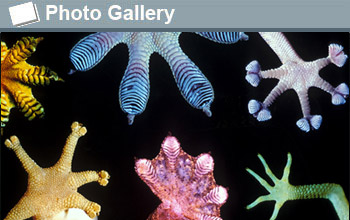 Credit and Larger Version |
On Earth Day and every day, our planet's high extinction rate begs the question: Why does humanity need the Earth's great variety of plants, animals and microorganisms--its biodiversity?
What: A Google+ Hangout sponsored by the National Science Foundation (NSF).
Subject: Experts will discuss the benefits of biodiversity--which benefits have been scientifically tested and which have yet to be tested; how biodiversity boosts scientific and engineering innovation; and how researchers are measuring biodiversity in the face of environmental change.
When: April 17, 2014 at 3 p.m. EDT. (An archived version of the Hangout will be posted on YouTube after the event.)
How to watch live and participate: Watch the Hangout on Google+ or YouTube. You are invited to submit questions before and during the Hangout via Twitter using #NSFLive, or via email at webcast@nsf.gov.
Potential discussion topics:
- What are some common myths about the benefits of biodiversity?
- How does biodiversity affect the well-being of humanity?
- How do economists estimate the value of healthy, diverse ecosystems?
- Why should we conserve even seemingly useless organisms that live in remote, uninhabited areas?
- How have studies of biodiversity serendipitously catapulted forward varied fields, from neuroscience to crime-busting?
- How are studies of animals and insects advancing the growing field of bio-inspired robotics--"the next wave" of robotics? And why do engineers need biological studies of animals to develop bio-inspired robots?
- How can global losses of biodiversity be stopped or reduced?
- Can the biodiversity of damaged ecosystems be restored?
- How much biodiversity does an ecosystem need in order to stay healthy and provide services?
- How are scientists analyzing the impacts of major threats, such as climate change, on biodiversity?
- What new tools or approaches are being used to measure biodiversity?
Guest panelists:
- Ed Boyden of MIT: A neuroscientist and expert on how studies of biodiversity have helped generate revolutionary new research tools.
- Bradley Cardinale of the University of Michigan: An expert on the impacts of humans on biodiversity and ecosystem health, and on how losses of biodiversity may impact ecological processes.
- Sarah Bergbreiter of the University of Maryland: An expert in insect-inspired robotics.
- Steve Polasky of the University of Minnesota: An expert on integrating ecological and economic analyses, biodiversity conservation and ecosystem services.
- Elizabeth Blood of NSF: NSF's program director of the National Ecological Observatory Network (NEON)--a massive, nationwide infrastructure that will collect precedent-setting long-term data on U.S. biodiversity.
Who may attend: Reporters, the public, researchers, students and teachers of all levels and any other interested individuals.
For interviews: Before or after the Hangout, reporters may arrange interviews with experts by contacting Lily Whiteman at lwhitema@nsf.gov or (703) 292-8310.
-NSF-
Media Contacts Lily Whiteman, National Science Foundation, (703) 292-8310, lwhitema@nsf.gov
Related WebsitesNEON at a Glance:
http://www.nsf.gov/news/news_videos.jsp?cntn_id=127598&media_id=74090&org=ENG
Optogenetic toolkit goes multicolor: http://newsoffice.mit.edu/2014/optogenetic-toolkit-goes-multicolor-0209
Critical Tool for Brain Research Derived from Pond Scum:
Optogenetic toolkit goes multicolor: http://newsoffice.mit.edu/2014/optogenetic-toolkit-goes-multicolor-0209
Critical Tool for Brain Research Derived from Pond Scum:
http://www.nsf.gov/discoveries/disc_summ.jsp?cntn_id=129298
Science Nation video on insect inspired robots:
Science Nation video on insect inspired robots:
http://www.nsf.gov/news/special_reports/science_nation/microrobotlegs.jsp
Secrets of the gecko foot help robot climb: http://news.stanford.edu/news/2010/august/gecko-082410.html
Bioinspired fibers change color when stretched:
Secrets of the gecko foot help robot climb: http://news.stanford.edu/news/2010/august/gecko-082410.html
Bioinspired fibers change color when stretched:
http://www.seas.harvard.edu/news/2013/01/bioinspired-fibers-change-color-when-stretched
RoboBees: Design Poses Intriguing Engineering, Computer Science Challengers:
RoboBees: Design Poses Intriguing Engineering, Computer Science Challengers:
The National Science Foundation (NSF) is an independent federal agency that supports fundamental research and education across all fields of science and engineering. In fiscal year (FY) 2014, its budget is $7.2 billion. NSF funds reach all 50 states through grants to nearly 2,000 colleges, universities and other institutions. Each year, NSF receives about 50,000 competitive requests for funding, and makes about 11,500 new funding awards. NSF also awards about $593 million in professional and service contracts yearly.
Useful NSF Web Sites:
NSF Home Page: http://www.nsf.gov
NSF News: http://www.nsf.gov/news/
For the News Media: http://www.nsf.gov/news/newsroom.jsp
Science and Engineering Statistics: http://www.nsf.gov/statistics/
Awards Searches: http://www.nsf.gov/awardsearch/
NSF Home Page: http://www.nsf.gov
NSF News: http://www.nsf.gov/news/
For the News Media: http://www.nsf.gov/news/newsroom.jsp
Science and Engineering Statistics: http://www.nsf.gov/statistics/
Awards Searches: http://www.nsf.gov/awardsearch/
The National Science Foundation (NSF)
Guillermo Gonzalo Sánchez Achutegui

No hay comentarios:
Publicar un comentario